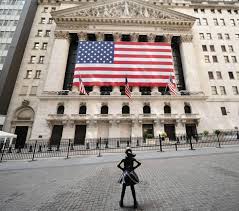US stocks bounced back on Monday, recuperating from the previous week's downturn triggered by discouraging labor statistics and ongoing trade ambiguity. The S&P 500, the Dow Jones Industrial Average, and the Nasdaq Composite all saw gains, marking a significant rebound from the dismal performance of the prior week.
Investors were buoyed by the market recovery following a steep decline on Friday, which saw the major indexes posting their most substantial weekly losses in months, breaking a streak of positive market strides. The sell-off was amplified by the disappointing July jobs report and significant downward revisions in previous months' job figures, altering the perception of the labor market's strength.
President Trump's confrontations with the Federal Reserve and Chair Jerome Powell remained in the spotlight, with market watchers adjusting their expectations regarding interest rate policies after the central bank opted to maintain rates unchanged for the fifth consecutive meeting. However, following the weak employment data release, almost 90% of market bets are now predicting a rate cut in September.
Meanwhile, market participants continued to monitor the repercussions of President Trump's tariff implementation. The newly revised tariffs, set to take full effect this week, range from 10% to 41% on a variety of trading partners, raising concerns about escalating costs amid broader inflationary pressures.
In a related development, Tesla's shares edged up after reports surfaced that the company had awarded CEO Elon Musk 96 million shares valued at around $29 billion. This news added a layer of intrigue to the already dynamics of the market.
In line with the ongoing earnings season, with over 100 S&P 500 companies slated to report, investor focus turned towards companies like Palantir, Eli Lilly, and Disney as they prepared to release their financial results.
Another notable stock movement was seen in Figma, which witnessed a more than 20% drop following its strong public debut. Similarly, Coinbase's stock was downgraded by analysts at Compass Point over concerns about the sustainability of the crypto platform's valuation in the face of market dynamics.
Despite the tumult in the markets, UBS strategists indicated a belief that President Trump's tariff policies are unlikely to trigger a recession or signal the end of the bull market. The strategists maintained that while tariffs may reach around 15%, the anticipated levels are not envisaged to be recession-inducing.
As a culmination of these market events, the broader economic landscape and geopolitical tensions continue to influence investment decisions and overall market sentiment. As investors navigate through the various challenges and uncertainties, the resilience of the market in the face of such headwinds will be closely scrutinized to gauge the trajectory for future market movements.

